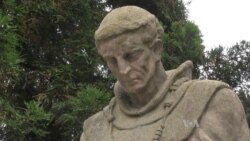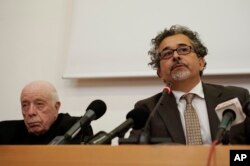On Wednesday Pope Francis canonized an 18th century missionary to Spanish California during his three-day papal visit to the United States. Some Native Americans criticized the elevation to sainthood of the missionary priest, Junipero Serra. Others defend Serra as a man of faith, despite the harsh treatment of indigenous peoples by the Spanish colonizers.
The founder of the Spanish colonial system of California missions, Serra is a towering figure for Andrew Galvan, curator of Mission Dolores museum in San Francisco. Galvan is American Indian, and one of his 18th century ancestors was baptized and is buried at this mission. He has complaints about the mission system, but has admired Serra since the 1970s.
“I have worked along with the friars (priests) since that time promoting Father Serra's cause,” he said. Pope John Paul II beatified Serra in 1989, the next-to-last step toward sainthood.
Galvan's cousin, Vincent Medina, also works at Mission Dolores museum and says Serra should not be canonized. “It's documented that he wanted the Indian languages suppressed,” Medina argues. “It's documented that he sent for whips for Indian people to be whipped.” Medina says a saint should rise above his times and that Serra did not.
Medina says the Spanish brought disease and cultural destruction. His ancestor was part of a group of working-age young men from East San Francisco Bay who were baptized in succession, and Medina says they were probably corralled in a roundup of workers.
At the Carmel Mission on the California coast, where Serra worked and is buried, he is remembered as a defender of indigenous peoples against their Spanish conquerors. Archeologist Ruben Mendoza of California State University, Monterey Bay, has come to admire him. He has studied Serra for 20 years and started as a critic.
“Being of Native American ancestry myself, Yaqui Indian, I don't give a pass to (disregard) colonialism,” said Mendoza. “On the other hand, when you look at the life of Serra very specifically, you will see that he is not only a man of his time, but he was well ahead of his time in that he was an advocate for native peoples.”
He says Serra once made an arduous journey to Mexico City to demand justice for two native women who had been raped by a soldier. Serra also asked for mercy for a group of native men awaiting execution for killing a priest.
Near Los Angeles, leaders of the Fernandeno Tataviam Band of Mission Indians, like many other native spokesmen, say Serra hurt indigenous peoples, although some Catholic tribal members have defended Serra. Tribal chairman Rudy Ortega, Junior, says he's reluctant to preach to the Catholic Church, but thinks the canonization of Serra will backfire.
“The indigenous people of California, all the Mission Indians of California, are going to read more about it, they're going to study harder, they're going to find more research and they're going to learn and they're going to expose more of the truth,” he said.
Even supporters of Serra's cause, like Andrew Galvan, say the church owes a debt to native peoples for their treatment, and he hopes the canonization will spark discussion and outreach.
Archeologist Ruben Mendoza says more of Serra's story needs to be told, and that many documents relating to his career remain unstudied in an archive in Mexico City. He argues that native Americans suffered under the Spanish, but suffered more under American jurisdiction, when native numbers diminished even further.
Pope Francis has apologized for the church's treatment of indigenous peoples, but says that some inside the church were their champions, and that Father Serra, as a man of heroic virtue, will be acknowledged as a saint. Native groups throughout California marched in protest on Wednesday as Serra was canonized in Washington.







